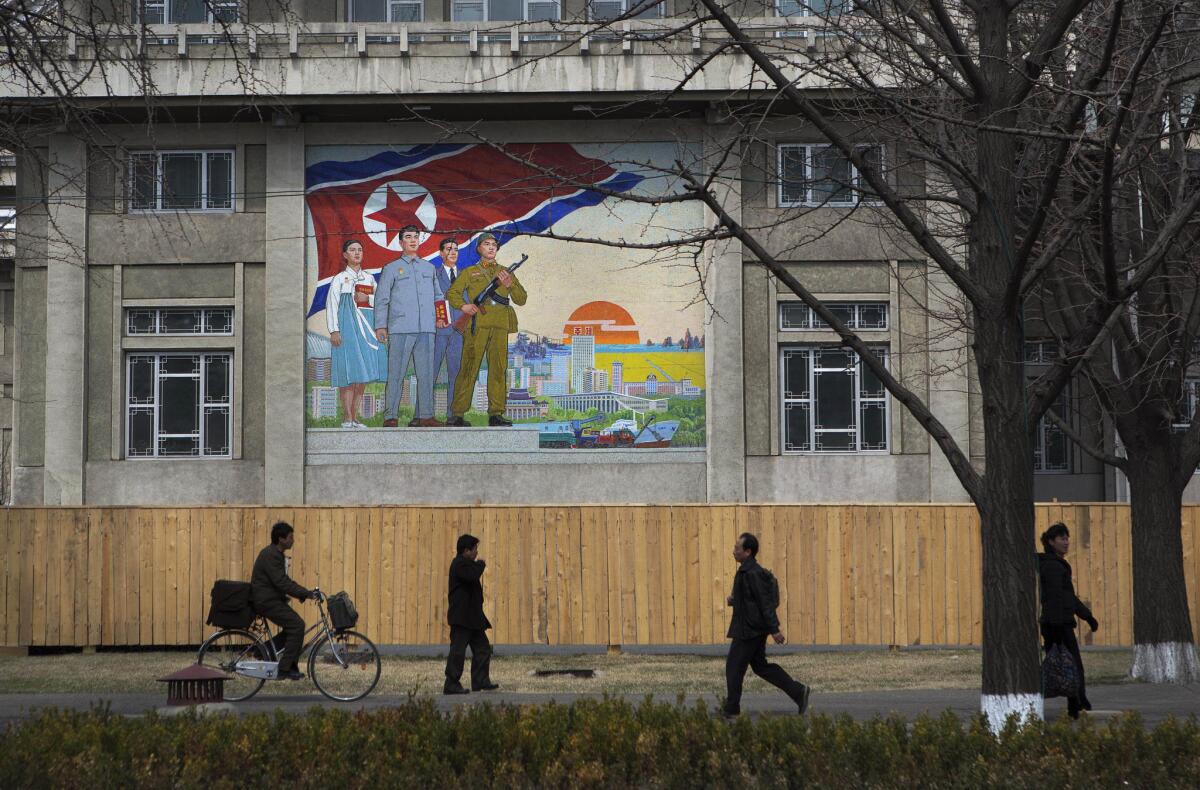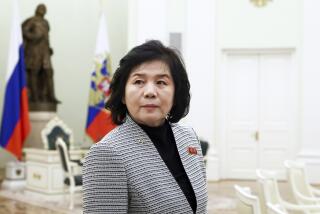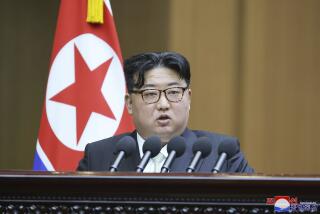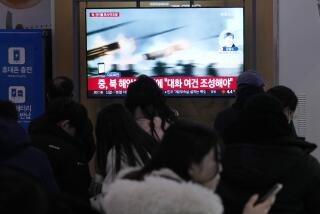North Korea demands end to U.N. sanctions before talks

North Korea insisted Thursday that the U.S. and South Korea must scrap United Nations sanctions and put an end to joint military drills before any talks on its nuclear arsenal can begin. The U.S. and South Korea have said the burden is on Pyongyang to pull back on its nuclear ambitions.
Experts say both sides have set out unrealistic demands. The South Korean Foreign Ministry derided the North Korean argument Thursday as “totally incomprehensible” and “illogical.” North Korea, in turn, is extremely unlikely to give up its nuclear bargaining chips before even getting to the table, analysts said.
But even talk of talk has been greeted as a welcome change after weeks of bombastic threats from Pyongyang. Though cautious about predicting what North Korea will do next, some analysts believe that such a change could be a first step toward opening dialogue to defuse tensions on the Korean peninsula.
The North Korean demands, implausible as they are, “could be seen as a step toward Pyongyang backing off the ledge,” said Suzanne DiMaggio, vice president of global policy programs at the Asia Society.
“It could offer an opening for Seoul and Washington to approach North Koreans,” possibly making some kind of contact that falls short of official talks, she said.
Tensions soared after North Korea conducted its third nuclear test in February, spurring a new, stiffer round of U.N. sanctions last month. At the same time, Pyongyang was infuriated by ongoing U.S.-South Korea military drills.
The isolated nation declared an end to a Korean War armistice and vowed nuclear attacks on its foes. Intelligence analysts said North Korea was poised to test as many as five missiles last week.
Yet a week later, both sides were talking about negotiations. Charles K. Armstrong, director of the Center for Korean Research at Columbia University, said he believes that was what North Korea was aiming for all along.
“Making a very strong, even outrageous set of statements, with the intention of negotiation from a position of strength -- that’s pretty consistent with their past behavior,” he said.
The military drills that left North Korea steaming are due to end in a week and a half, which is expected to dial down tensions. A key day in the North Korean calendar -- a holiday marking the birthday of its late founder, Kim Il Sung -- passed Monday, which could allow “posturing” to die down, Armstrong said.
So far, North Korea has not launched the missiles it moved to its east coast, as had been feared last week. Pyongyang may still press ahead with a missile test to shore up support at home before talking to Washington, said Marcus Noland, senior fellow at the Peterson Institute for International Economics.
“The problem is, if you’re [North Korean leader] Kim Jong Un and you are putting your nuclear program on postage stamps and billboards and having mass rallies in Pyongyang chanting that this is the lifeblood of the nation ... if you’ve built all that up, it’s quite hard to back away.”
“He needs some way to declare victory,” Noland said. After carrying out a missile test, North Korea could tell its people “they’ve come begging to talk to us,” and resume negotiations.
DiMaggio said that wouldn’t help bring the U.S. or South Korea to the table, however.
“Seoul and Tokyo would feel more threatened,” she said. “They’d want the U.S. to offer more reassurance that they’re protecting their allies. That would likely include more joint military exercises.”
Another important player is China. Beijing has evidenced growing frustration with North Korea, a situation that has spurred hopes it might put more pressure on its longtime ally. U.S. Secretary of State John F. Kerry visited China last week, mentioning Korean tensions among several “very challenging issues” before meeting with President Xi Jinping. What China is doing behind the scenes could prove crucial.
Experts caution that reading North Korea under its new young leader remains difficult. Weeks ago, former basketball star Dennis Rodman returned from the country saying that Kim just wanted President Obama to call him. Soon after, Pyongyang vowed to attack the U.S. and South Korea.
“This still strikes me as a fairly capricious and unpredictable regime,” Noland said.
ALSO:
Pervez Musharraf flees after Pakistan court orders his arrest
U.S. takes step toward possible military intervention in Syria
New Zealand legalizes gay marriage; supporters break out in song
More to Read
Start your day right
Sign up for Essential California for news, features and recommendations from the L.A. Times and beyond in your inbox six days a week.
You may occasionally receive promotional content from the Los Angeles Times.





